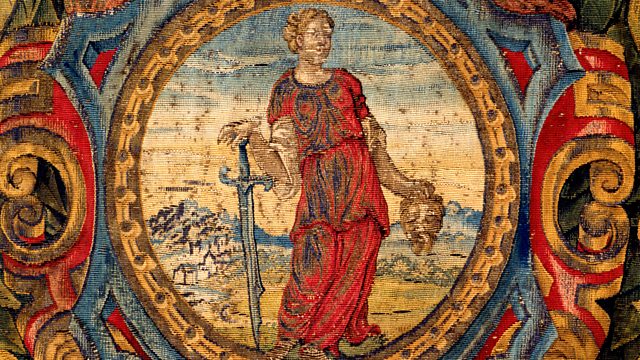Judith beheading Holofernes
Melvyn Bragg and guests discuss how artists such as Gentileschi, Caravaggio and Klimt responded to this Bible story of the widow who killed an enemy general to save her people.
Melvyn Bragg and guests discuss how artists from the Middle Ages onwards have been inspired by the Bible story of the widow who killed an Assyrian general who was besieging her village, and so saved her people from his army and from his master Nebuchadnezzar. A symbol of a woman's power and the defiance of political tyranny, the image of Judith has been sculpted by Donatello, painted on the ceiling of the Sistine Chapel and, in the case of Caravaggio, Liss and Artemisia Gentileschi, been shown with vivid, disturbing detail. What do these interpretations reveal of the attitudes to power and women in their time, and of the artists' own experiences?
The image of Judith, above is from a tapestry in the Duomo, Milan, by Giovanni or Nicola Carcher, 1555
With
Susan Foister
Curator of Early Netherlandish, German and British Painting at the National Gallery
John Gash
Senior Lecturer in History of Art at the University of Aberdeen
And
Ela Nutu Hall
Research Associate at the Sheffield Institute for Interdisciplinary Biblical Studies, at the University of Sheffield
Producer: Simon Tillotson
Last on
LINKS AND FURTHER READING
��
READING LIST:
The New English Bible with the Apocrypha (Oxford University Press, 1970)
Alice Bach, Women, Seduction and Betrayal in Biblical Narrative (Cambridge University Press, 1997)
Mieke Bal (ed.), The Artemisia Files: Artemisia Gentileschi for Feminists and Other Thinking People (University of Chicago Press, 2005), especially ‘Feminist Dilemmas with the Art/Life Problem’ by Griselda Pollock
R. Ward Bissell, Artemisia Gentileschi and the Authority of Art: Critical Reading and Catalogue Raisonné (Pennsylvania State University Press, 1999)
Giovanni Boccaccio (trans. Guido Guarino), On Famous Women (first published 1374; Italica Press, 2011)
Bodo Brinkmann, Cranach: Exhibition catalogue (Royal Academy, 2008)
Keith Christiansen and Judith Mann (eds.), Orazio and Artemisia Gentileschi (Yale University Press, 2001)
Mary D. Garrard, Artemisia Gentileschi: The Image of the Female Hero in Italian Baroque Art (Princeton University Press, 1989)
Germaine Greer, The Obstacle Race: The Fortunes of Women Painters and Their Work (Farrar, Straus and Giroux, 1979)
James Hall, Dictionary of Subjects and Symbols in Art (first published 1974; John Murray, 1989)
Howard Hibbard, Caravaggio (Icon, 1983)
Alexandra Lapierre (trans. Liz Heron), Artemisia: The Story of a Battle for Greatness (Vintage, 2001)
Patricia Lee Rubin and Alison Wright, Renaissance Florence: the Art of the 1470s (National Gallery, 1999)
Caroline P. Murphy, Lavinia Fontana: A Painter and Her Patrons in Sixteenth-century Bologna (Yale University Press, 2003)
Rozsika Parker and Griselda Pollock (eds.), Old Mistresses: Women, Art and Ideology (Pandora, 1981), especially ‘Framing Judith: Whose Text, Whose Gaze, Whose Language?’ by Ela Nutu
Griselda Pollock, Visions and Difference: Femininity, Feminism and Histories of Art (Routledge, 1988)
Margarita Stocker, Judith, Sexual Warrior: Women and Power in Western Culture (Yale University Press, 1998)
Eve Straussman-Pflanzer, Violence and Virtue: Artemisia Gentileschi’s Judith Slaying Holofernes, (Yale University Press, 2013)
Ann Sutherland Harris and Linda Nochlin, Women Artists: 1550–1950 (Los Angeles County Museum of Art, 1976)
Giorgio Vasari (trans. Gaston du Vere), The Lives of the Most Eminent Painters, Sculptors, and Architects (first published 1550; Knopf, 1996)����������������������������������������������������
Rossella Vodret, Caravaggio: The Complete Works (Silvana, 2010)
��
Broadcasts
- Thu 14 Feb 2019 09:0091�ȱ� Radio 4
- Thu 14 Feb 2019 21:3091�ȱ� Radio 4
Featured in...
![]()
17th Century—In Our Time
Browse the 17th Century era within the In Our Time archive.
![]()
Religion—In Our Time
Discussion of religious movements and the theories and individuals behind them.
![]()
Culture—In Our Time
Popular culture, poetry, music and visual arts and the roles they play in our society.
In Our Time podcasts
Download programmes from the huge In Our Time archive.
The In Our Time Listeners' Top 10
If you’re new to In Our Time, this is a good place to start.
Arts and Ideas podcast
Download the best of Radio 3's Free Thinking programme.
Podcast
-
![]()
In Our Time
Melvyn Bragg and guests discuss the ideas, people and events that have shaped our world.



